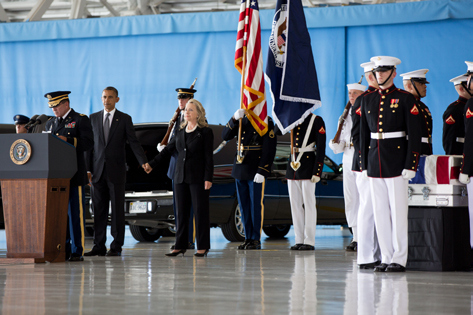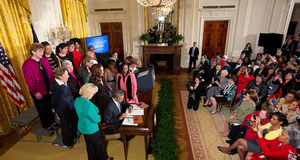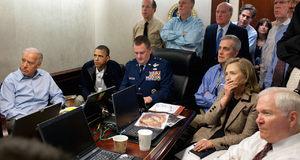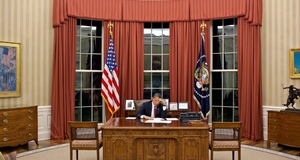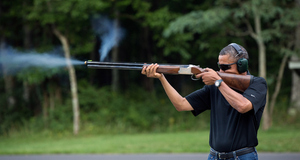From Cornell International Affairs Review VOL. 6 NO. 2Barack, Benghazi, and Bungles: Tracing the Obama Administration's Handling of the Benghazi AttacksIII. Post-Election UpdatesOn November 16, former Director of the CIA David Petraeus met with legislative officials for the first time since his resignation.35 While speaking to House and Senate Intelligence Committees, Petraeus reported that the Obama administration immediately knew of the terrorist involvement in the Benghazi attacks, and yet elected to mislead the American public, but for good reason: "Classified intelligence reports revealed that the deadly assault on the American diplomatic mission in Libya was a terrorist attack, but the administration refrained from saying it suspected that the perpetrators of the attack were Al Qaeda affiliates and sympathizers to avoid tipping off the groups… avoiding alerting the militants that American intelligence and law enforcement agencies were tracking them."36 After more than two months of disagreement over the extent of the Obama administration's knowledge of the events, Petraeus's testimony convinced many legislators that the president's weak initial explanations had less to do with slow and contradictory intelligence, and more to do with national security concerns and maybe even political considerations. After Petraeus's hearing, the White House adamantly denied that the administration's discreet, and less than truthful, early responses were motivated by anything other than the noblest reasons.37 President Obama and Secretary of State Hilary Clinton stand during the transfer of remains ceremony, celebrating the sacrifice of Christopher Stevens, Sean Smith, Glen Doherty and Tyrone Woods, who were killed in the attack. On December 18th, the State Department released its Accountability Review Board (ARB) report of the Benghazi attacks, in order to assess the government's preparedness and response to the attacks, as well as provide recommendations to protect against future assaults on American diplomatic posts. In the report, the ARB affirmed what the American public had come to accept: the attacks were not the natural outgrowths of spontaneous protests against Innocence of Muslims, but were "terrorist attacks" and "there was no protest prior to the attacks."38 After requesting more aid and personnel authorization from Congress, the ARB report admitted of "systemic failures and leadership and management deficiencies at senior levels," as well as significant flaws in the intelligence community.39 Instead of sharply criticizing the Obama administration's misuse of on-hand and accurate intelligence, the ARB report harangued the intelligence community for early inaccuracies in the Benghazi narrative, claiming "known gaps existed in the intelligence community's understanding of extremist militias in Libya and the potential threat they posed to U.S. interests."40 Months after the attack, and the presidential election, controversy has continued to follow the Obama administration's handling of the foreign incident. When at a Senate hearing on January 23rd, Secretary Clinton was barraged with questions concerning Benghazi. Clinton responded to Senator Ron Johnson's questions about the inaccuracy of initial assessments, and the extent to which the Obama administration went to mislead the American public, by telling the Senate: "What difference, at this point, does it make? It is our job to figure out what happened and do everything we can to prevent it from ever happening again, Senator."41 It has become apparent to political observers that the administration is purposely shifting its public posture towards future prevention and away from mention of past indiscretions. IV. ConclusionAlmost one month after the Benghazi tragedy, U.S. State Department officials publicly acknowledged that protests did not predate the attacks.42 Previously, President Obama and other high-level personnel in the administration had maintained that the attacks were outgrowths of protests against an offensive online video. Even after intelligence officials and foreign politicians had come to solid conclusions on the Benghazi attacks, President Obama refused to make public statements about the known nature of the attacks and, as David Petraeus has argued, the president even withheld valuable intelligence from Congress and the American public. In the aftermath of the Benghazi terrorist attacks, FBI investigations have been slow and erratic, and the Obama administration has been remarkably vague and unhelpful to Congress when dealing with new information pertaining to the attacks. The White House adamantly denied that the administration's discreet, and less than truthful, early responses were motivated by anything other than the noblest reasons To date, no report has explicitly and compellingly connected the inadequacies of Obama's responses to campaign considerations, and some data actually highlights how the president's cagey disposition about Benghazi adversely affected his campaign. After reviewing the administration's investigations, handlings of the press, and inter-branch relationships following the Benghazi attacks, I believe that the Obama administration wanted to keep this issue out of the political forefront, and this political agenda led to numerous oversights and bungles. It would be foolish, however, to heap all of the blame on the White House. Concrete evidence leads us to conclude that the shifting, incoherent nature of the nation's response to Benghazi represents the product of a perfect political storm, caused by many actors—from a campaign trail president to intelligence gatherers to foreign heads of state—approaching this foreign affairs crisis with different aims, checks, resources, and personal interests. Endnotes
Suggested Reading from Inquiries Journal
Inquiries Journal provides undergraduate and graduate students around the world a platform for the wide dissemination of academic work over a range of core disciplines. Representing the work of students from hundreds of institutions around the globe, Inquiries Journal's large database of academic articles is completely free. Learn more | Blog | Submit Latest in International Affairs |

